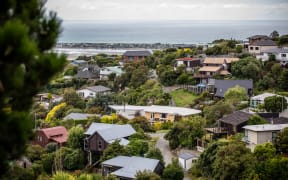Inflation has hit a 32-year high - How did we get here, what impact will it have and how long can we weather the storm?

Photo: 123RF
How did we get here?
"How did we get here? Well, we had Covid and after Covid we had a war," economist and author Shamubeel Eaqub told First Up.
"Those two things really increased prices a hell of a lot."
The two biggest increases people would have noticed in the past year were prices at the petrol pump and at the supermarket. Those were because of global issues, he said.
"A third of the prices were coming from global factors, a third was coming from housing, a third of it was coming from domestic factors."
Domestic inflation was really high, Eaqub said, driven by things like professional services, real estate services and the "absolutely gang busters cost of construction".
It was likely those things were expensive because of labour shortages and because immigration had been completely closed for some time, he said.
"We're kind of in this awkward situation right, we've just had Covid, borders were closed, no workers were coming in, materials prices were through the roof, I don't want to hear about GIB anymore - we've had all these issues come together to create this perfect storm.
"That's where we see central banks around the world increasing interest rates, because it's an inflation surge around the world."
How much pressure is on employers to increase wages?
As people struggle to keep up how much pressure is on employers to up wages to help them out?
BusinessNZ chief executive Kirk Hope said businesses were desperate to keep people, causing wage pressure in some sectors.
"I do think there are some things we could do, some policy settings that we could change to alleviate some of the staffing pressures because this is a supply side issue really."
In healthcare that looks like enabling nurses to come into New Zealand without the two-year 'work to residence pathway' restriction, alleviating pressure and as a result leading to being able to safely relax Covid-19 settings, he said.
"You can't claim for one moment the healthcare sector is not under pressure and that's one of the reasons why we've had really really tight Covid settings so until we alleviate that pressure we're going to be challenged with inflation for some period of time."
First Union researcher and policy analyst Edward Miller told Morning Report wages were rising, with the average wage and the labour cost index pushing up around 5 percent.
He thought investing in universal quality public services was one way to improve standards of living without massively increasing inflationary pressures.
"Part of it's weathering the storm and part of it's making sure wage growth follows inflation close enough so that workers aren't left behind. But a lot of those pressures are coming from the international environment so there's also a bunch of things the government can't do to respond to those."
Are interest rate hikes justified?
Miller doesn't think so.
"I don't think there's a wage price spiral in this country and I don't think there's a threat of a wage price spiral. Organised labour doesn't have the ability to hike prices like we used to."
Corporate profiteering and international supply chain disruptions were driving inflation, Miller said.
Workers shouldn't be punished by "hawkish" rates prices from the Reserve Bank, he said.
Hope said it didn't matter how much more someone earned, their dollar would be worth less if inflation became embedded in the economy.
"That's a real risk so they really do have to take action," he said.
"There is variable demand across the economy, there are some sectors which are doing quite well, other sectors who themselves may already might be losing money."
Eaqub said higher interest rates were inevitably going to slow the rate of construction.
"That really does worry me that while we're going to control inflation we might also be killing off housing supply, which we desperately need."
Are people accessing the support they are entitled to?
Nelson-based beneficiary advocate Kay Brereton said a high number of people on low wages were missing out government support they were entitled to - particularly the accommodation supplement.
But it was hard to reach people not on a benefit but who were still entitled to support, Brereton said.
"Some of these people could even get some food help."
Brereton said she was seeing more people who were working but needing help to get by, with people being unable to afford food because of the high cost of accommodation.
"That's the real driver for the poverty I see, is people are spending well over half of their income on accommodation, sometimes up to 80 percent of their income on accommodation."
For some, there was only $20 per household member a week available for food.
Food banks weren't really the answer to that problem, she said, with food security coming from people having their own choices about the food they need or like.
"It's much better if people actually have the dignity of their own choices about food."
Food grants give people more food sovereignty, she said.
"I would like to see the government making it easier for people to get food grants at the moment, extending the caps so that people can get a bit more help.
"What I see is that people manage somehow - I'm not sure how - until something unseen comes up like car needs repair or you've got to go to the doctor and that just throws out a really tight budget and leaves them short."
Brereton would like to see the government look at a universal basic income.
How long can we weather the storm?
It's control vs impact, Eaqub said. "We have very low control but it has very high impact."
"The impact is highest for our lower income households because when the cost of living goes up, so food, fuel, rent, there is very little left to spend on other things."
People don't have money left over to spend.
It was why we had record low consumer confidence, business confidence and house sales were at recession lows.
"Yes we will weather it, and we will weather it through a recession."




